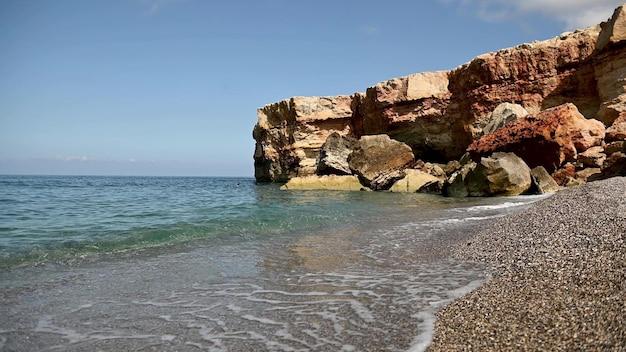Rocks have been solid and immovable features of our Earth for millions of years. They are a fundamental part of our natural environment, forming mountains, cliffs, and riverbeds. But have you ever wondered why rocks sink in water?
When we think of rocks, we often associate them with solidity and weight. So, it may come as a surprise that some rocks can actually float in water. But before we dive into the details, let’s explore the factors that determine whether a rock sinks or floats.
In this blog post, we will delve into the science behind why rocks sink in water, the types of rocks that float, and why specific properties of rocks contribute to their ability to sink or float. We will also address common questions like whether wood can sink and what causes stones to sink in water. So, let’s unravel the mysteries of buoyancy and find out why some rocks defy gravity while others succumb to the depths.
Why Do Rocks Sink: A Deep Dive into the Mystery
The Science Behind Sinking Rocks
Ever wondered why rocks, those solid chunks of Earth’s crust, have the audacity to sink? Well, let’s dive into the science behind this seemingly baffling phenomenon, shall we?
Density: The Heavyweight Champion
One of the key factors determining whether a rock sinks or floats is its density. Density measures how tightly packed the material within an object is. Rocks, compared to other materials like water or air, are quite dense. In fact, rocks are denser than most things we encounter on a daily basis (unless you live in a cave made entirely of solid gold).
Archimedes’ Principle: Wait, Who’s Archimedes?
No, Archimedes is not a rock sinking superhero (though I’d pay to see that movie). He was a Greek mathematician and thinker, and he discovered an important principle that helps us understand sinking rocks. Archimedes’ Principle states that an object immersed in a fluid (like water) experiences an upward buoyant force equal to the weight of the fluid it displaces.
Wait, Rocks Displace Fluids Too?!
Believe it or not, rocks do displace fluids! When a rock is submerged in water, it pushes water out of the way (displaces it) to make room for itself. This displaced water creates an upward force that opposes the rock’s weight. If the rock’s weight is greater than the buoyant force, down it goes, sinking to the murky depths.
The Shape of Things to Sink
Now that we understand the role of density and buoyancy, let’s talk about the shape of rocks. It turns out, shape matters too!
Smooth and Streamlined
Rocks with smooth surfaces and streamlined shapes are more likely to sink than their jagged counterparts. Smooth rocks have fewer nooks and crannies, allowing water to flow smoothly around them. This results in less buoyant force, making them more prone to sinking. So, if you’re ever in a boat made entirely of round rocks, be prepared for potential “rocky” situations.
Heavyweights Only
In the rock world, weight matters (no, not the kind featured in a wrestling ring). The greater the weight of a rock, the more likely it is to sink. So, if you stumble upon a hefty boulder during your hike, you better believe it’s more likely to meet the depths below. It’s like the rock equivalent of a sumo wrestler—we wouldn’t expect them to float in a pool, would we?
The Bottom Line: A Sinking Conclusion
In summary, rocks sink due to their high density and the principle of buoyancy. With their denser nature and weight, rocks are primed for a sink or swim situation in water. So, the next time you skip stones across a pond and watch them disappear beneath the water’s surface, remember the science behind their descent—it’s not magic, it’s just nature doing its thing.
Now that we’ve uncovered the secrets of sinking rocks, we can marvel at the wonders of physics and impress our friends with our newfound knowledge. After all, who doesn’t enjoy a light-hearted conversation about rocks sinking to their watery demise? Embrace your inner rock enthusiast and share the fascinating science behind this timeless puzzle.
FAQ: Why Do Rocks Sink
Do any minerals float
Minerals can be found in various forms, and while some minerals may have a higher density and sink in water, others can indeed float. For example, the mineral pumice is a lightweight and porous mineral that is known to float due to its low density.
Does all wood float in water
Contrary to popular belief, not all types of wood float in water. Various factors, such as the wood’s density and moisture content, influence whether it will sink or float. Generally, denser woods like teak or mahogany tend to sink, while lighter, less dense woods such as balsa can float effortlessly.
What are some rocks that float
While most rocks are known to sink, there are a few exceptions. One notable example is pumice, as mentioned earlier. Another rare type of rock that can float is obsidian, a volcanic glass formed from rapidly cooled lava. However, it’s important to note that these floating rocks are the exception rather than the rule.
Do igneous rocks float
Igneous rocks are predominantly formed from cooled magma or lava, and their density varies depending on their composition. While some igneous rocks can have a low enough density to float, the majority of igneous rocks, including common ones like granite or basalt, will typically sink in water due to their higher density.
Why do rocks sink in water
The primary reason rocks sink in water is their density. Density is a measure of how much mass an object has in relation to its volume. When the density of an object is higher than that of water, it will sink. Rocks, being solid and often composed of denser materials than water, tend to have a greater density, causing them to sink below the water’s surface.
Does marble sink or float
Marble is a dense metamorphic rock formed by the recrystallization of limestone. Due to its higher density, marble typically sinks when placed in water.
What are the materials that float and sink
Many materials can either float or sink depending on their density. Generally, materials with a lower density than water will float, while those with a higher density will sink. Examples of materials that usually float include wood, plastic, cork, and certain types of foam. On the other hand, materials such as metals, stone, and most rocks tend to sink.
Why do some materials float or sink in water
The ability of a material to float or sink in water is primarily determined by its density. If the material is less dense than water, it will float. Conversely, if its density is higher than that of water, it will sink. Understanding the concept of density helps explain why certain materials float while others sink when placed in water.
Why do small pebbles sink in
Small pebbles typically sink in water because their density exceeds that of water. While larger rocks may have a density that allows them to float, smaller pebbles tend to be denser, causing them to sink to the bottom rather than remaining afloat.
Does wood sink in water? Which word is a material noun
Wood, being a natural material derived from trees, can sink or float depending on its density. Different types of wood have varying densities. While some types of wood can float, like balsa wood, others, such as denser hardwoods like oak or walnut, tend to sink. Therefore, the word “wood” itself serves as a material noun.
What material floats best on water
Among the commonly known materials, cork is well-known for its ability to float effortlessly on water. The structure of cork has many air-filled cells, resulting in a low density that enables it to stay afloat. Its buoyancy makes cork an ideal material for various purposes, including life jackets, fishing nets, and even certain kinds of floating devices.
Why stone does not float
Stones, often composed of dense minerals or materials, typically have a higher density compared to water. As a result, the density of stone exceeds that of water, causing it to sink rather than float. The concept of density plays a vital role in determining whether an object will sink or float in water.
Does pebble sink in water
Yes, in general, pebbles tend to sink in water due to their higher density. Pebbles are usually smaller in size and can consist of denser materials, contributing to their propensity to sink to the bottom of the water.
Which stone does not sink in water
While most stones will sink in water due to their density, pumice is a unique exception. Pumice is a type of stone formed from volcanic eruptions that results in its distinctive lightweight and porous nature. As a result, pumice can float in water.
What determines whether something floats or sinks in water
An object’s ability to float or sink is determined by its density compared to that of water. If the object’s density is lower than that of water, it will float; if the density is higher, it will sink. Density is calculated by dividing an object’s mass by its volume.
Which of these rocks can float on water
Among the rocks mentioned, pumice and obsidian are the two types that can float on water due to their low densities compared to water. However, it’s worth noting that these rocks are not commonly found and are exceptions rather than the norm when it comes to rocks floating.
Do rocks sink or float
As a general rule, rocks tend to sink when placed in water. Most rocks have a higher density than water, causing them to sink below the water’s surface rather than remaining afloat.
What causes a stone to sink
The primary factor causing a stone to sink is its density. If the density of a stone is greater than that of water, it will sink. Stones typically consist of dense minerals or materials, resulting in a higher overall density compared to water.
Where do rocks float
Rocks primarily float in environments where buoyant forces overcome their weight. One example is lava rocks floating on molten lava during volcanic eruptions. This occurrence happens due to the extreme temperatures and lower density of the molten lava, allowing the rocks to float briefly.
Why does a wooden boat float on water
A wooden boat floats on water due to the concept of buoyancy. Buoyancy is the upward force exerted by a fluid, such as water, on an object submerged in it. The shape of the boat and the hollow spaces within it displace enough water to generate an upward force that balances the boat’s weight, causing it to stay afloat.
Can rocks float in water
In general, rocks do not float in water. Rocks are typically composed of dense materials, resulting in a higher density than water. This higher density causes rocks to sink below the water’s surface rather than remaining buoyant and floating.

